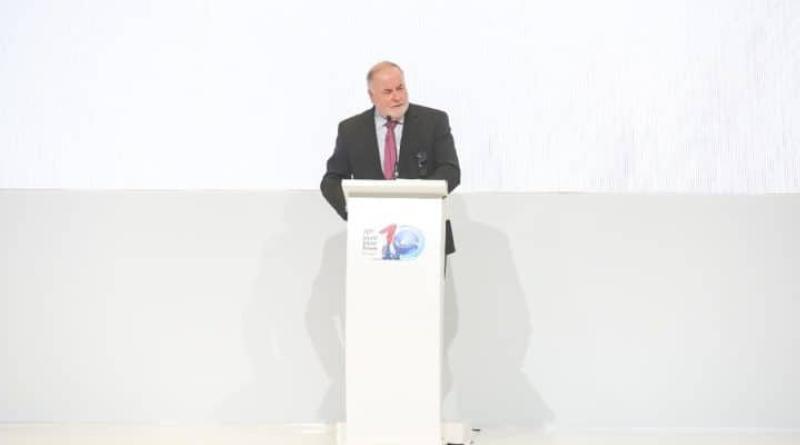Loic Fauchon: “Peace and prosperity cannot be achieved by ignoring water”

The 10th World Water Forum opens this Saturday, May 18, 2024 in Bali, Indonesia, under the theme "Water for shared prosperity". In this interview with Afrik 21, Loïc Fauchon, President of the World Water Council (WWC), which is co-organizing this international meeting with the host country, talks about the role of water in a country's social and economic development, and the challenges facing the sector.
Inès Magoum: Co-organized by Indonesia and the World Water Council (WWC), the 10th edition of the World Water Forum takes place from May 18 to 25, 2024 in Bali, Indonesia, under the theme “Water for shared prosperity”. What do you mean by shared prosperity? And why link water and shared prosperity for this year’s event?
Loïc Fauchon: Establishing a strong link between water and shared prosperity is crucial, as inequalities in people’s access to clean, safe water and sanitation for all persist in many parts of the world.
Water is essential to all the fundamental aspects of life. Water is essential for health, food, energy, education and economic development.
Everyone wants peace and prosperity in the world. For the future of our planet. For our children, who will be the adults of tomorrow.
How can we do this if we ignore water and waste it?
Demographic pressure, climatic hazards, water-borne diseases and pollution are all factors in a deep crisis. We need to make political and economic decision-makers, consumers and residents aware of the importance of sharing water fairly, securing water resources, conserving water and controlling wastewater. The future of our planet is at stake.
How can shared prosperity in the water sector contribute to meeting today’s water and sanitation challenges?
Investing in resilient, sustainable water infrastructure can strengthen communities’ ability to cope with the challenges of climate change and extreme events and disasters such as droughts and floods. Integrated water resource management at basin level, taking into account overall resources and the needs of all users, can promote more efficient and sustainable water use.
Cross-border dialogue between countries bordering rivers, lakes and forests, through the establishment of cooperation structures between riparian nations, can also promote best practices, as well as the protection of catchments, river restoration, depollution and water saving. There are many more (good practices) to be showcased during the 300 sessions of the 10th World Water Forum in Bali.
Over 1,4000 participants, including experts, political decision-makers and representatives of civil society, are expected in Bali from Saturday May 18. Will the discourse on shared prosperity for all in the water sector be the same for all, or will it depend on the realities and climate of each country or continent?
The World Water Forum offers a valuable opportunity to establish a dialogue between different regions of the world through thematic sessions and political conferences. This enables countries, local authorities and water managers to share solutions and best practices for overcoming common challenges, even if they face different realities.
During the forum, a specific space will be opened up to the world’s regions, with more than fifty specific meetings and cross-fertilization dialogues. So, Africa in all its diversity, the Mediterranean, the Asia-Pacific (a geographical group made up of the Far East, the Indian subcontinent and Oceania, editor’s note) will come together and exchange… For example, Mediterranean countries may face problems of water scarcity and water stress due to their arid climate, while Asia-Pacific nations may face challenges linked to natural disasters such as typhoons and floods. These two examples will resonate with representatives from African countries, who are also experiencing these two critical situations, sometimes on the same territory, and more often than not one after the other.
Good water management. In your view, this is the key to achieving shared prosperity. But when can a country be said to manage its water resources well? And what are the prerequisites?
Water management rests on three pillars: knowledge, finance and governance.
The first, knowledge, is based primarily on innovation:
Water safety must benefit from technical and digital developments. Today, for example, seawater desalination by reverse osmosis is used in over 70 countries worldwide at an acceptable cost. The reuse of treated wastewater is another major advance that will gradually become widespread.
Digitization is also a major step forward, enabling farmers and citizens, for example, to monitor their daily consumption and detect network leaks.
The second pillar is obviously financial. The situation can be summed up as “water is short of money, but money is short of water”. How can we avoid this, and devote more money to access to water and sanitation? In terms of financing, water lags far behind energy. Is the water sector condemned to remain the poor relation in infrastructure financing, compared to energy and telecommunications? What an injustice!
This brings us to the third pillar, governance, which must guarantee equitable sharing and total transparency. The days of water centralism are over. Water governance must be effectively shared between the State, which guarantees the resource and controls its proper use. Then there’s the role of watersheds, which organize the sharing of resources, and between uses, guaranteeing quality through public policies. And finally, there is the level of local authorities and citizens who ensure treatment and distribution, as well as pricing according to social situations and uses.
The Bali forum will last seven days. What’s planned for the week?
Plenary sessions will bring participants together to discuss the major issues in global water management, highlighting the challenges, opportunities and best practices for ensuring equitable access to water and promoting sustainable management of water resources.
Some 300 thematic sessions will enable participants to focus on specific topics such as water security, cross-border cooperation, technological innovation and sustainable financing. These in-depth discussions will provide a space to explore complex issues and share solutions tailored to local and regional needs.
But the 10th World Water Forum in Bali will above all be the place for political commitments, because our fellow citizens want answers to their problems.
What kind of commitments should we expect from world leaders to effectively improve access to water, particularly in sub-Saharan Africa, where 418 million people still live without access to drinking water, according to the United Nations Children’s Fund (UNICEF)?
On behalf of the World Water Council, we call on world leaders, executives, elected officials and parliamentarians to make concrete commitments to effectively improve access to water for all, including, but not limited to, individual and collective rights. In the face of the global water crisis, decisive and coordinated action is needed to guarantee this fundamental and essential right to life and human dignity.





